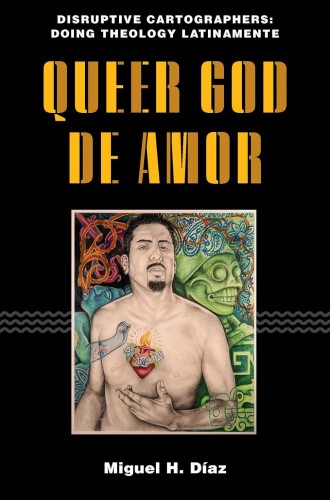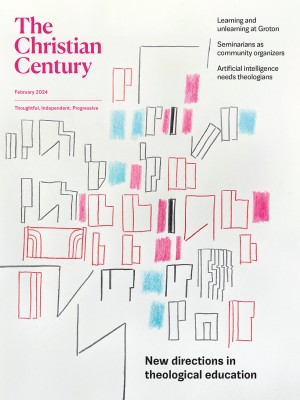An ambitious queer reading of John of the Cross
Miguel Díaz takes the medieval mystic’s sexual metaphors for spirituality seriously—along with the lived experience of LGBTQ people.

Queer God de Amor
Disruptive Cartographers: Doing Theology Latinamente
In a statement shared by New Ways Ministry, a Catholic outreach and advocacy organization, Miguel Díaz describes his new book as follows: “Queer God de Amor offers, as I see it, a contribution to trinitarian theology by retrieving texts and metaphors of the Spanish mystic San Juan de la Cruz (St. John of the Cross) through a Latinx hermeneutic that takes seriously daily lived experiences and relationships of LGBTQ+ people.” In addition to accurately summarizing the book’s aim to contribute to trinitarian theology by rereading John of the Cross’s poetry, commentaries, and letters, Díaz’s concise statement expresses the book’s approach to and stakes in rereading the 16th-century Spanish mystic’s writing.
Queer God de Amor takes John of the Cross’s sexual metaphors for spirituality seriously within the Catholic analogical imagination, which in turn opens theological activity to the fullness of human life in a way that affirms the range of human sexuality today. In a chapter section titled “A Queer ‘y qué’” (“A Queer [and] ‘So What’”), Díaz declares, “Retrieving and resourcing Latin@ theologies of God sanjuanistamente [in the style of San Juan] represents a new direction with ethical, practical, and pastoral implications, especially and preferentially with respect to queer Catholic persons.” Therefore, the book’s approach to rereading John of the Cross’s writing is rooted in a commitment to a life of faith informed by the author’s own journey as a queer Catholic Latino theologian.
Read our latest issue or browse back issues.
The single-sentence description Díaz gives of the book is true in yet another sense. The qualifying phrase, “as I see it,” acknowledges that readers of the book might not see it the author’s way. In fact, the Catholic Foreign Mission Society of America (also known as the Maryknoll Society) did not see it his way when—without providing a reason, according to Díaz—it notified him that it was terminating his contract with Orbis Press to publish Queer God de Amor. This attempt to prevent the book’s publication testifies to the ministerial need to which it affirmatively responds. As Nicholas Hayes-Mota’s review of the book confirms, “for queer and Latine Catholics, like myself, [this book] is a theological lifeline.” For offering that lifeline, both the book’s author and its publisher, Fordham University Press, should be recognized.
Like its title, Queer God de Amor brings together multiple languages. Working with the Spanish in which John of the Cross’s texts were written, Díaz begins the first chapter by highlighting how the verb gustar (to like, to taste, or to savor) “provides a way of knowing God via a love in which one not only knows but also savors the beloved” in San Juan’s poem “Spiritual Canticle.” Díaz goes on to argue that John of the Cross “uses the Spanish language to creatively unpack highly complex notions related to [the] process of purification and illumination that leads to knowing and uniting with God.” In this and many other instances, linguistic translation proves crucial for Díaz’s rereading of San Juan’s writings in affirmation of the fullness of human life.
In fact, his own practice of translation is as creative as John of the Cross’s use of the Spanish. Díaz translates a verse in the poem “Dark Night of the Soul” that reads “amada en el Amado transformada” as “lover and beloved, transforming one into the other.” The Spanish original keeps the object of transformation clearly defined via grammatical gender agreement: the amada (beloved) is the one who is transformada (transformed). Díaz’s translation, “transforming one into the other,” opens the possibility of mutual transformation. At the very least, the chiastic structure of his translation—in which lover corresponds to other and beloved corresponds to one—suggests such a possibility.
But Díaz’s practice of translation in the service of his argument goes beyond the linguistic. The book speaks from within Christian traditions not readily associated with queer theology as a field, though queer theologians draw from a range of religious practices. It is in this practice of translation across Christian traditions that the book may be most illuminating for those interested in the broader study of religion, sexuality, and culture. Most references to key texts in the field of queer theology appear in Díaz’s fifth chapter, “Queering the God de Amor.” Marcella Althaus-Reid, who was a member of the Metropolitan Community Church at the time of her death, features prominently throughout the chapter. However, Díaz’s most consistent interlocutors throughout the book are Catholic feminist theologians, including his doctoral adviser, Catherine Mowry LaCugna.
In other words, Díaz is doing queer theology in a Catholic systematics manner. This raises the question: What might queer theology look like outside of the mainline liberal Protestant history with which it is usually associated? Queer God de Amor joins other recent texts, such as Ashon Crawley’s 2016 Blackpentecostal Breath: The Aesthetics of Possibility, that look within other Christian traditions for their own queer articulations.
Meanwhile, the turn to a Spanish mystic for “resourcing Latin@ theologies” raises another question: On what grounds do the writings of a 16th-century Spanish mystic speak to Latinx theology? Given Díaz’s training in trinitarian theology, it is clear why St. John of the Cross’s writings would draw his attention. As Bernard McGinn puts it in The Essential Writings of Christian Mysticism, “John of the Cross stands out not only as a profound mystical poet, but also as a great systematician of mystical theology.” But how does one address the colonial context that is a condition of possibility for St. John of the Cross’s writings to speak to Latinx theology, let alone in a “shared” Spanish language? Through its practice of translation, Queer God de Amor raises these difficult questions that stand as testament to its bold choice: to chart its own path in a life of faith committed to a “rethinking of the mystery of God” in relation to the fullness of human life.





